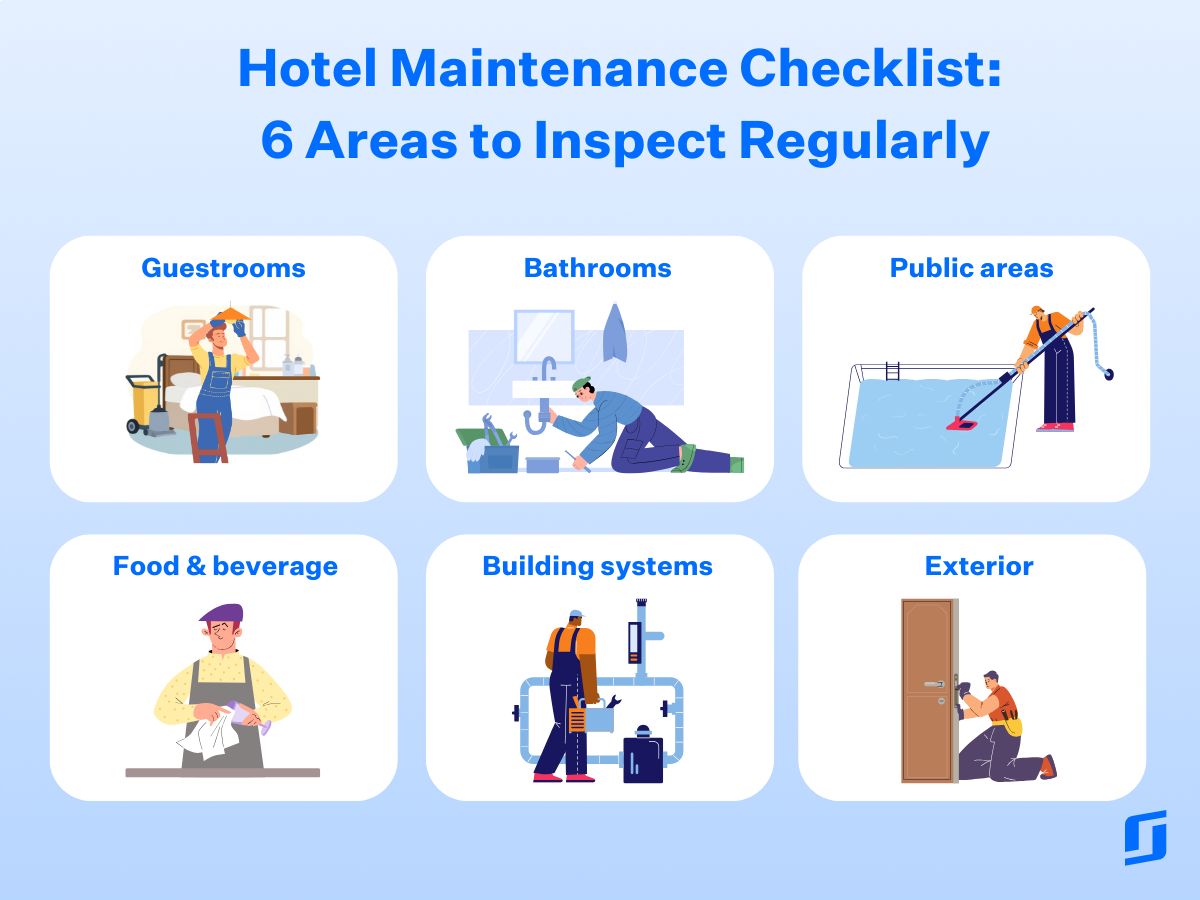What is hotel maintenance?
Hotel maintenance is the ongoing process of inspecting, repairing and servicing a property’s facilities, systems and equipment to ensure everything remains safe, functional and presentable. It extends the life of your hotel assets, reduces costly breakdowns, and ensures a positive guest experience.
Hotel maintenance is a critical operational function that aims to preserve both the physical condition and aesthetic appeal of the property. Depending on the size of the hotel, it may be undertaken by members of staff, a dedicated team, or a third-party provider.
Property upkeep includes back-of-house maintenance on systems and infrastructure that ensure the hotel functions properly (air conditioning, electrical, plumbing), and front-of-house maintenance that makes the property more presentable (furniture, landscaping, pool areas). It encompasses three main types of work:
- Preventive maintenance: Regular inspections and servicing to avoid failures.
- Corrective maintenance: Fixing issues as they arise.
- Predictive maintenance: Using data to anticipate repairs before problems occur.
This blog will explain how proper maintenance can reduce costs, support compliance, enhance the guest experience, and put a hotel in a position to make more money.
Table of contents
Why is hotel maintenance important?
Hotel maintenance is vital because it protects a hotel’s assets and reputation, and ensures guests enjoy a safe, comfortable and appealing experience. Regular maintenance keeps operations running smoothly and reduces the likelihood of costly issues and breakdowns. It ultimately leads to greater guest satisfaction and loyalty, resulting in more bookings and revenue.
Hotel maintenance plays a central role in both day-to-day operations and long-term business success. A well-maintained property creates a positive first impression and can directly influence guest reviews and loyalty. Preventive maintenance helps to avoid equipment failures that could disrupt service – air conditioning issues, power outages, plumbing leaks – while ensuring compliance with local health, safety, and building regulations.
Proper upkeep of infrastructure like electrical fixtures, lifts and HVAC systems also helps to reduce energy costs and extend the lifespan of valuable assets. The benefits extend beyond the technical and financial: consistent maintenance creates a culture of efficiency and supports staff morale. Employees can deliver better guest experiences when systems function reliably.
Key takeaways
- Regular maintenance protects assets, prevents breakdowns and keeps hotel operations running smoothly.
- Well-maintained facilities boost guest satisfaction, reviews and long-term loyalty.
- Consistent upkeep lowers energy costs, extends asset life and supports staff efficiency.
Streamline your hotel operations with SiteMinder
Optimise staffing, reduce costs, and improve guest satisfaction with a platform that gives you real-time insights and control across your hotel operations.
Learn about our platform
What can you commonly find in a hotel maintenance checklist?
A hotel maintenance checklist typically includes regular inspections of plumbing, electrical, HVAC and safety systems, along with checks on guest rooms, public areas and exterior facilities. Tasks can cover everything from testing smoke alarms and servicing lifts to repairing fixtures and mowing lawns. The goal is to ensure all areas of the hotel remain safe, functional and visually appealing.

More specifically, a hotel maintenance checklist might include the following items:
- Guestrooms: It’s critical to ensure that all in-room amenities work, and that any issues, from blown lightbulbs to broken beds, are fixed instantly.
- Bathrooms: Check for loose fittings and fixtures, and fix dripping taps, shower heads and cisterns. Regular deep cleaning of wet areas prevents built-up grime and mold.
- Public areas: A well-maintained lobby ensures a guest’s first impression is a good one. Hotels are often chosen based on amenities like gyms and swimming pools, but if poor maintenance means they don’t meet expectations or create safety concerns, a hotel damages its reputation.
- Food & beverage areas: Maintenance in F&B areas is a matter of compliance. You need to ensure bars and kitchens meet regulatory standards, while also creating a well-functioning and aesthetically pleasing space that guests will want to enjoy.
- Building systems: Guests expect perfect comfort during their stay, so it’s critical to create a hotel preventive maintenance checklist that covers HVAC, plumbing and electrical systems. Ensuring these systems operate efficiently also helps a hotel to maximise profitability.
- Exterior: Particular care needs to be taken of hotel elements that are exposed to Mother Nature. Create maintenance checklists for the doors, windows and facade of the building; gardens, landscaping and irrigation systems; car parks, paths and other thoroughfares; and any roof-mounted machinery, equipment and assets.
Key takeaways
- A hotel maintenance checklist covers all key areas, from room fixtures to utilities to the building itself.
- Regular inspections ensure operational efficiency, regulatory compliance, and guest safety and comfort.
- Preventive maintenance protects assets, enhances the guest experience and upholds the hotel’s reputation.
How does proper hotel maintenance affect bookings & revenue?
Proper hotel maintenance directly increases revenue by boosting guest satisfaction, generating positive reviews, and preventing costly repairs and room outages. Well-maintained properties command higher booking rates, reduce operational costs through preventive care, and build brand loyalty that drives repeat business and referrals.
Market data on maintenance costs:
- Hotels typically spend 8-12% of operating revenue on maintenance activities. This range forms a benchmark many use to plan maintenance budgets.
- According to some reports, over 70% of hotel guest complaints originate from room problems such as broken equipment and issues with climate control.
- In 2025, J.D. Power reported that guest satisfaction with hotel maintenance had declined notably in recent years, with the blame placed on rising maintenance costs.
The benefits of a thorough and holistic approach to hotel maintenance are many and varied, particularly in terms of securing bookings and maximising revenue:
Boost guest satisfaction & reviews
Guests see maintenance as a fundamental function of a hotel, so evidence of less-than-perfect upkeep can result in a reputational hit through online reviews and word of mouth. On the flipside, a well-maintained property can earn great reviews that are key to building the reputation of your hotel business, spreading the good news online and through personal networks.
Higher booking rates
With maintenance fuelling positive reviews and word of mouth marketing, it can play a significant role in generating new business for hotels. And when everything works precisely as it should in the hotel, new guests are more likely to become loyal return customers.
Reduce costly repairs
Aside from negatively affecting the guest experience, critical failures in complex infrastructure like HVAC systems can be expensive to fix. Preventive and predictive maintenance keep a hotel business running smoothly by dealing with potentially significant and costly issues before they arise.
Reduce revenue loss
Proper maintenance helps to avoid situations in which a hotel’s rooms and amenities go out of service, which can lead to lost revenue or reputational hits from disappointed guests. It also ensures all hotel systems run as efficiently as possible, minimising operational costs.
Strengthen brand loyalty
The key to earning loyalty from hotel guests is to offer a consistently high quality experience. Fully committing to a hotel maintenance schedule forms the foundation of that quality and consistency, by ensuring everything works as it should, and freeing up staff to enhance guest stays in unique and personalised ways.
Key takeaways
- Well-maintained hotels boost guest satisfaction and reviews, directly drive new bookings and return business.
- Preventive maintenance reduces the costly repairs, downtime and operational inefficiencies that can erode profit.
- A structured approach to maintenance empowers hotel staff to enhance guest experiences.
How can owners stick to their hotel’s preventive maintenance checklist?
Hotels can maintain a consistent preventive maintenance schedule by making it someone’s responsibility (whether a team or individual), by properly training those responsible, and by implementing systems and tech to track the maintenance.
Allocate the task
While it can be tempting to push preventive maintenance down the to-do list, it’s critical that it remains a priority, as deferring the job can turn small issues into big, expensive and unsafe problems. Hotels can guard against this by assigning clear responsibilities for each task. Someone – whether an individual or the head of your maintenance department – needs to ultimately be accountable for the work.
Train your staff
A hotel needs to give its employees the knowledge and skills they need to succeed. Train your staff on preventive maintenance to ensure they know the issues to look for and how to fix them.
Create a maintenance schedule
The intricacies of preventive maintenance – exactly what needs to be done, and when – must be clearly defined. You should create checklists for regular, long-term and ad hoc maintenance, and establish clear systems and processes to ensure all work is completed on time, without fail.
Track maintenance with tech
How do you ensure all preventive upkeep is completed? Dedicated hotel maintenance software can help by automating reminders, tracking progress and monitoring completion rates. More general strategic planning efforts can also help to reduce the cost and disruption of maintenance. SiteMinder, for example, features occupancy forecasting that can inform hotel upkeep schedules by identifying low-demand periods where major maintenance will affect the fewest possible guests.
Integrate to SiteMinder’s vast ecosystem
Connect to SiteMinder’s extensive network of technology systems and partners to maximise your efficiency, bookings, and revenue.
Learn More
Frequently asked questions on hotel maintenance
How much should hotels budget for maintenance annually?
On average, hotels allocate around 8–12% of their operating revenue to maintenance each year. This range is typically reliant on lower cost preventive upkeep, but is also designed to handle unexpected repairs.
Should hotels hire in-house maintenance staff or outsource?
The right balance depends on a hotel’s size, budget and infrastructure. Many hotels use a hybrid model, employing in-house staff for daily upkeep and outsourcing complex or seasonal tasks to specialists.
How do hotels track and schedule preventive maintenance?
Hotels often use property management software or dedicated computerised maintenance management systems (CMMS) to log tasks, set reminders and track work orders. These tools are designed to create schedules and ensure no potential issues are overlooked.
What hotel maintenance tasks are required by law?
Legal requirements typically include safety checks on lifts, fire systems, electrical wiring, gas fittings and emergency lighting, but you should contact your local authorities to understand your responsibilities in terms of health, building and environmental regulations.
How does preventive maintenance reduce operating hotel costs?
Preventive maintenance identifies and fixes issues early, reducing expensive emergency repairs. It also improves energy efficiency and extends the lifespan of key assets.
How can hotels minimise guest disruption during maintenance?
Hotels should schedule major maintenance during low occupancy periods or daytime hours when most guests are out. Using occupancy forecasting tools helps identify optimal windows, while clear communication with affected guests and offering alternative amenities can further reduce disruption.

